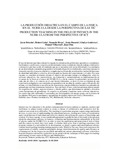Mostrar el registro sencillo del ítem
La producción didáctica en el campo de la fisica en el NURR-ULA desde las perspectivas de las tic
| dc.rights.license | http://creativecommons.org/licenses/by-nc-sa/3.0/ve/ | |
| dc.contributor.author | Briceño B., Jesús R. | |
| dc.contributor.author | Lobo, Hebert | |
| dc.contributor.author | Rivas, Yasmelis | |
| dc.contributor.author | Rosario, Jesús | |
| dc.contributor.author | Gutiérrez, Gladys | |
| dc.contributor.author | Villarreal, Manuel | |
| dc.contributor.author | Díaz, Juan Carlos | |
| dc.date.accessioned | 2011-06-21T17:39:45Z | |
| dc.date.available | 2011-06-21T17:39:45Z | |
| dc.date.issued | 2011-06-21T17:39:45Z | |
| dc.identifier.issn | 1690–3226 | es_VE |
| dc.identifier.uri | http://www.saber.ula.ve/handle/123456789/33357 | |
| dc.description.abstract | El uso de Internet para fi nes educativos supone la comunicación global entre aprendices o estudiantes, facilitadores o profesores y expertos en determinados temas creando un clima de trabajo colaborativo e interactivo que hace sentir al estudiante que no se encuentra solo en sus difi cultades. La enseñanza de un determinado contenido programático utilizando dispositivos multimedia, constituye una nueva forma de concebir el proceso educativo, creando nuevas formas de socialización e incluso defi niciones de identidad individual y colectiva, diversifi cando las fuentes del conocimiento y el saber. Por estas razones, se considero pertinente orientar el objetivo del presente trabajo a la indagación sobre los software educativos, sus características, su evaluación y sustancialmente su implementación en el campo de la física en el marco del NURR-ULA, a fi n de conocer la aplicación y proyección de cada uno de ellos y el contexto en el cual fueron elaborados, es decir sí estos se originan de una experiencia pedagógica con contenidos programáticos de un plan de estudios para el desarrollo del mismo, o si sencillamente es un software de experiencias y juegos didácticos basados en contenidos de aprendizaje con fi nes meramente formativos. Sea cual fuese el caso, estás herramientas deben cumplir los requisitos de validez, aspectos técnicos y diseño gráfi co, que determinan la calidad y efi ciencia como herramienta de aprendizaje. Al respecto se presentan y analizan varios software educativos, los cuales han sido elaborados o asesorados por investigadores de nuestro grupo con la técnica de las páginas Web para la enseñanza y aprendizaje de algunos tópicos de Física y Matemática. | es_VE |
| dc.language.iso | es | es_VE |
| dc.rights | info:eu-repo/semantics/openAccess | |
| dc.subject | Producción didáctica | es_VE |
| dc.subject | TIC | es_VE |
| dc.subject | Multimedia | es_VE |
| dc.subject | Software educativo | es_VE |
| dc.title | La producción didáctica en el campo de la fisica en el NURR-ULA desde las perspectivas de las tic | es_VE |
| dc.title.alternative | The didactic production in the fi eld of physics in the NURR-ULA from the perspectives of the tic | es_VE |
| dc.type | info:eu-repo/semantics/article | |
| dc.description.abstract1 | Internet use for education is the global communication between students or students, teachers and facilitators or subject matter experts to create a climate of collaborative and interactive feel the student is not alone in its diffi culties. The teaching of a particular program content using multimedia devices, is a new way of understanding the educational process, creating new forms of socialization and even defi nitions of individual and collective identity, diversifying the sources of knowledge and wisdom. For these reasons, it was considered appropriate to guide the aim of this study to the question about the educational software, its features, evaluation and implementation substantially in the fi eld of physics under the NURR-ULA, in order to meet the application and projection of each of them and the context in which they were made, if whether these arise from a teaching experience with program content of a curriculum for its development, or simply a games and entertainment software content-based teaching learning training purposes only. Whatever the case, these tools must meet the requirements of validity, technical and graphic design, which determine the quality and effi ciency as a learning tool. In this respect are presented and analyzed various educational software, which have been developed or advised by researchers in our group with the technique of Web pages for teaching and learning of some topics in Physics and Mathematics. | es_VE |
| dc.description.colacion | 70-89 | es_VE |
| dc.description.email | jesusb@ula.ve | es_VE |
| dc.description.email | hlobo@ula.ve | es_VE |
| dc.description.email | yasmeher@hotmail.com | es_VE |
| dc.description.email | jrosario@ula.ve, jorosario@grinceg.org.ve | es_VE |
| dc.description.email | gladysg@ula.ve | es_VE |
| dc.description.email | mavu@ula.ve | es_VE |
| dc.description.email | juand@ula.ve, jcdaz@hotmail.com | es_VE |
| dc.identifier.depositolegal | 200202TR1298 | es_VE |
| dc.subject.dependencia | Servicios Bibliotecarios de la Universidad de Los Andes (SERBIULA) | es_VE |
| dc.subject.facultad | Núcleo Rafael Rangel (NURR) | es_VE |
| dc.subject.keywords | Didactic production | es_VE |
| dc.subject.keywords | ICT | es_VE |
| dc.subject.keywords | Education software | es_VE |
| dc.subject.publicacionelectronica | Academia | es_VE |
| dc.subject.seccion | Academia: Ensayo | es_VE |
| dc.subject.thematiccategory | Artes y Humanidades | es_VE |
| dc.subject.tipo | Revistas | es_VE |
| dc.type.media | Texto | es_VE |
Ficheros en el ítem
Este ítem aparece en la(s) siguiente(s) colección(ones)
-
Academia - Año 10 - Nº 19
Enero --Junio 2011


